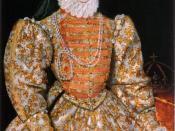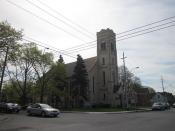This sermon by Bishop John Aylmer was given before Queen Elizabeth I circa 1601. The subject of the sermon is that of women, and their position or role in society. When writing and giving this sermon, Bishop Aylmer had to ensure that he did not offend the queen by likening her to other women who were seen as the least important members of society. This idea seems to be a dichotomy, how can women in society hold such little importance in a patriarchal society, that is ruled by a queen. For this reason it seems, the sermon was written to appease the queen and the other attendants of the sermon, that it is assumed were mostly male.
He starts by giving an appraisal of the better women in society, i.e. the queen, and even against popular belief, puts these better women above some men, although this would have most probably been aimed solely at Elizabeth I.
Of course the position of a woman was largely decided on her wealth, or that of her husbands rather. A recent term used to describe women throughout history is 'Hidden from history', this does not mean that they have no history, rather that they were not allowed to be incorporated into history, they have "Lacked a history because society ha been unwilling to see them as a separate group⦠If a group does not exist, it can have no rights"1. Only the wealthy, like the queen, are allowed by society to be included, although marginally.
Bishop Aylmer starts by telling his audience that women are of two sorts, he goes on to describe these first he starts with the better of the two groups of women, wiser and better learned, this indicates the level of education held by a woman. As there was no pressure for education in the 16th and 17th century most women were illiterate, again only the rich were usually educated. Queen Elizabeth I was a very well educated woman, she could read, write and speak Latin, French, German and Italian fluently as well as English.
He goes on to say that these women are more discreeter, by this he means pure, pure religiously and spiritually, not tempted by the devil (witchcraft), as was a common accusation for many women, and less inclined to do wrong, he means this in a supporting way for the queen, The Virgin Queen, an image of purity. His final remark on the better women is that they are 'More constant than a number of men' this phrase can be interpreted as saying women, unlike some men, will generally stick to their principles and beliefs, rather than change to forward themselves. This may have been true, but how was a woman meant to forward herself in the surrounding society.
With this section of his sermon finished, that had no doubt left the vain2 Elizabeth happy because it is obvious it for her, he then moves onto the more widespread feelings towards women expressed throughout society.
'But another and worst sort' he opens with, means most other women in society. He, it seems, rants on about all of the things he can think off that are characteristic of these women, a few for example, 'Foolish⦠witlessâ¦feeble [and] careless' he is again referring to education. It is accepted that most women were uneducated, through no fault of their own, but this is emphasised by Aylmer. He also uses physical differences against women, as again most men did. Feeble, it is a fact that women, as a rule, are weaker than men, and Aylmer emphasises this fact. He also calls them careless, he means by this that they are not as thoughtful, rational and as logical as men, an idea that ran well into the 19th Century, that women are ruled by emotion.
These were all common beliefs at the time and Bishop Aylmer knows he can say such horrid things without reprise, because it is firmly accepted that what he says is correct.
Most importantly, being a religious leader, he describes these women as 'Evil-tonguedâ¦dregs of the Devil's dunghill'. He is making a reference to the belief in the occult, witchcraft. Around the time of this sermon, witchcraft was becoming more of a popular belief.3 By mentioning the Devil he is relating the embodiment of evil, to women furthering the ideas of witchcraft that led to hysteria both at home and abroad.
With this sermon the Bishop's intention was to outline the national feeling towards most women in society, but in order to do this he had to separate the queen from other women, or he may have faced punishment. He was very clever in doing this, by outlining positive characteristics of the queen, under a guise of 'Some women' where it is clear he was only referring to the queen and a handful of wealthy women. Having raised the position of Elizabeth, he could proceed to enforce existing ideas of women, being lower than everyone else, having no rationality and attempting to join with the devil. These beliefs were entertained by most men in society, again leading to the problem of having a female monarch.


